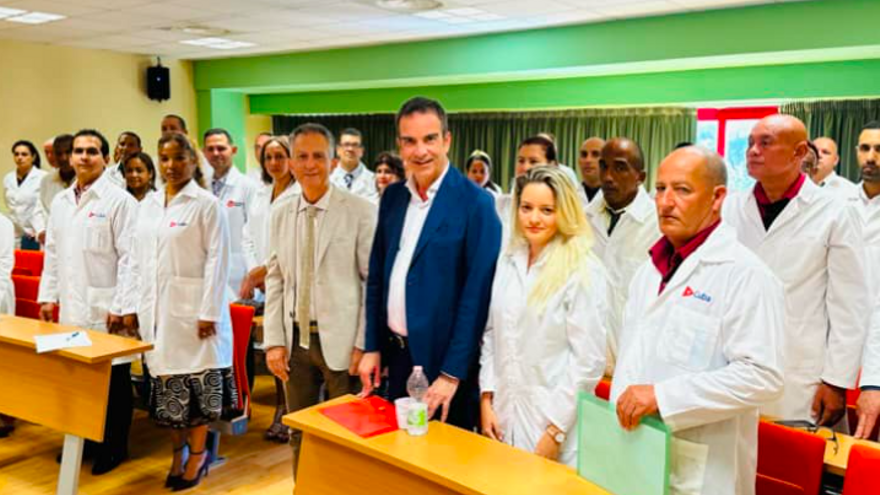
![]() 14ymedio, Havana, 5 August 2023 — A contingent of 120 Cuban doctors arrived this Thursday in Calabria, in southwestern Italy, as confirmed by Roberto Occhiuto, president of the region. “I said it and I repeat it: they are not going to steal any jobs from Italian doctors,” said the politician, given the suspicions that the hiring of the group has aroused, as it the 51 healthcare workers that have been working in the province since last January.
14ymedio, Havana, 5 August 2023 — A contingent of 120 Cuban doctors arrived this Thursday in Calabria, in southwestern Italy, as confirmed by Roberto Occhiuto, president of the region. “I said it and I repeat it: they are not going to steal any jobs from Italian doctors,” said the politician, given the suspicions that the hiring of the group has aroused, as it the 51 healthcare workers that have been working in the province since last January.
“They will give us great help,” said Occhiuto, who claimed that the Cubans had “great experience, widely appreciated both by the Italian doctors who worked with them and by the patients in the hospitals they treated.” The official hopes that, given the difficulties that the Calabrian health system is going through, according to Occhiuto, the island’s physicians will help “keep the departments and hospitals open.”
To the announcement, made by the Calabrian president on his Facebook profile, was added a message detailing where the Cubans are expected to work. Some 42 – he wrote – will go to the provincial health organization of Cosenza, while 22 will work in the capital of the region, Catanzaro. Seventeen will live in Crotona and the same number in Cosenza. Another 9 will work in Vibo Valentia, 2 in Dulbecco di Catanzaro and the rest in various regional offices.
OnCuba reported that the healthcare workers were received by the highest authorities of the region at the University of Calabria. For his part, Occhiuto gave them a “warm welcome” and admitted that the initiative had generated criticism, but that now there was a “will to cooperate” between Italian health workers and those who come from the island.
According to the outlet, Occhiuto had already mentioned the controversy several times and was forced to state -during the signing of the contracts with Cuba, in Rome- that the arrival of the Cubans did not affect the employment of Italian doctors and that 2,500 from the country itself had been accepted by the Calabrian Health system.
The politician also said, during a television interview, that the solution was partial and that it will be necessary to sign 2,300 new contracts in a year and a half to achieve optimum performance.
Last May, the Cuban Minister of Health, José Ángel Portal Miranda, and his Italian counterpart, Orazio Schillaci, meeting in Geneva, Switzerland, signed a memorandum of understanding for collaboration in the area of health and medical sciences.
The document stipulated the strengthening of cooperative relations and contained a mention of the Henry Reeve medical brigade, which had already worked in the Lombardy and Piedmont regions during the coronavirus pandemic. At that time, there were already 63 Cuban doctors working in that country.
Italy is not the only European country that has opted to hire health workers from the island. The Government of Portugal announced that it will employ between 200 and 300 doctors from different Latin American countries – including Cubans – to perform functions in health centers health and ensures that “all rights” of professionals will be respected.
During Cuban President Miguel Díaz-Canel’s visit to Portugal in mid-July, President Marcelo Rebelo de Sousa had revealed his interest in hiring Cuban doctors after verifying the work of health workers in Italy. Initially, the service would be exercised for a period of three years.
According to the Portuguese outlet Jornal de Noticias, Rebelo de Sousa explained that the Cubans would collect their money without intervention from the Havana regime*. The president said he had asked Cuba for a “different agreement than usual” to also pay those hired directly. Supposedly, he managed to get the Cuban government to accept it, although the exact terms of the agreement are still unknown.
The medical brigades are one of the main sources of foreign currency for the Cuban government, despite being frequently pointed out as systems of forced labor by international organizations such as Human Rights Watch or Prisoners Defenders. The United States also included Cuba in the list of countries that violate human rights.
The Cuban government has also been accused of using the contingents to maintain its influence in allied countries, such as Mexico, Italy, Qatar, Brazil, Venezuela or Nicaragua. The National Office of Statistics and Information (Onei) calculated that, in 2021, the Cuban State collected 4.349 billion dollars for the export of health services to foreign governments.
*Translator’s note: The common arrangement to date has been for foreign governments to pay the Cuban government directly for each worker, and from this the Cuban government pays each worker only a portion of the total — in some cases as little as 10% — and retains the rest.
____________
COLLABORATE WITH OUR WORK: The 14ymedio team is committed to practicing serious journalism that reflects Cuba’s reality in all its depth. Thank you for joining us on this long journey. We invite you to continue supporting us by becoming a member of 14ymedio now. Together we can continue transforming journalism in Cuba.
